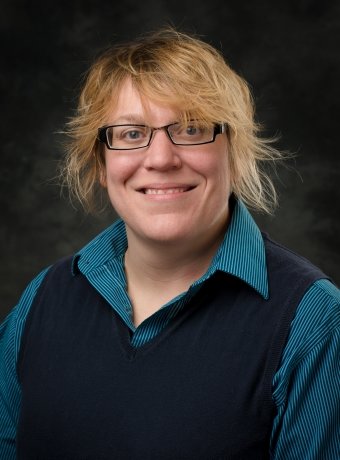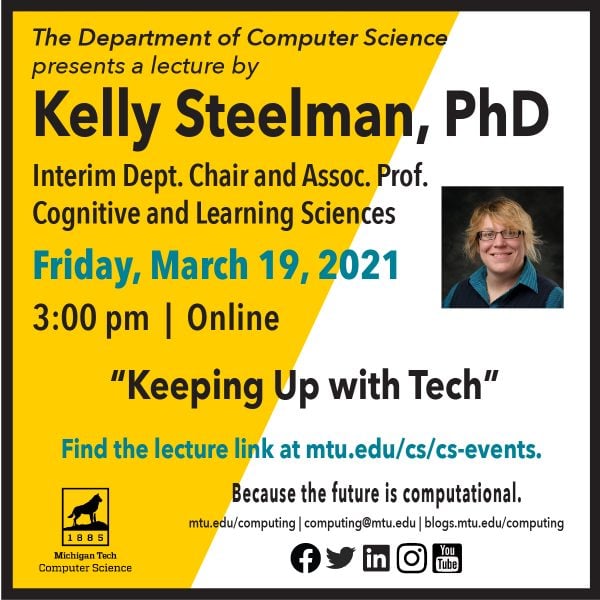Shane Mueller (CLS/ICC-HCC) will be presenting at the National Academy of Sciences/Air Force Research Laboratory (AFRL) Human-AI Teaming Through Warfighter-Centered Designs Workshop this afternoon (July 29) at 2:30 p.m.
Mueller’s presentation is titled “Human-centered approaches for explainable AI.”
by Pasi Lautala
Thomas Oommen (GMES, ICC), Ricardo Eiris, (CEGE, ICC), and Beth Veinott (CLS, ICC) are among eight Michigan Tech researchers who have submitted a a record number of eight concept papers for proposed research projects with the Federal Railroad Administration.
The Federal Railroad Administration (FRA) requested that Michigan Tech submit a record number of eight concept papers for proposed research projects as part of their 2021 Broad Agency Announcement.
In addition, Tech is a subcontractor for two more concept paper proposals. The paper submittal was coordinated by the Rail Transportation Program and the range of topics speaks to the diversity of Michigan Tech’s expertise applicable to the rail transportation. The PIs are looking forward to FRA decisions on how many of these papers advance to full proposals.
Each of the 10 projects had a different principal investigator (PI), representing six university departments/institutes and several more co-PIs.
The project titles and their PIs include:
- Hyper- and Multi-spectral Sensing and Deep Learning for Automated Identification of Roadbed Condition, (PI, Thomas Oommen, GMES).
- Wire Arc Additive Manufacturing (WAAM) for Weld Enhanced Cast Steel Coupler Knuckles (PI, Paul Sanders, MSE).
- IoT Assisted Data-analytics Framework Enables Assessment of Location Based Ride Quality (LBRQ) (PI, Sriram Malladi, MEEM).
- RailStory: Using Web-based Immersive Storytelling to Attract the Next Generation of Young Women in Rail (PI, Ricardo Eiris, CEGE).
- A Risk Informed Decision-Making Framework for Coastal Railroad System Subjected to Storm Hazards and Sea Level Rise (PI, Yousef Darestani, CEGE).
- Rail Corridor Life-Cycle Assessment (LCA) Framework, Factors and Models to Support Project Evaluation and Multi-Modal Comparisons (PI, Pasi Lautala, CEGE).
- Development of Infrared Thermography for Effective Rail Weld Inspection (PI, Qingli Dai, CEGE).
- Enabling Longer-distance, AI-enabled Drone-based Grade Crossing Assessment in Potentially GPS Denied Environments (PI, Colin Brooks).
- Multi-Site Simulation to Examine Driver Behavior Impact of Integrated Rail Crossing Violation Warning (RCVW) and In-Vehicle Auditory/Visual Alert (IVAA) System (PI, Elizabeth Veinott, subcontract with Virginia Tech).
- Evaluation of Non-traditional Methods of Reducing Emissions in Short Line Railroad Operations (PI, Jeremy Worm, subcontract with ASLRRA).
by Cognitive and Learning Sciences
Department of Cognitive and Learning Sciences (CLS) chair candidate Kelly Steelman will give a talk from 3 to 4 p.m. Monday (April 12).
In the talk, she will share her administrative philosophy and goals for the department.
One Michigan Tech graduate student found a silver lining of the pandemic-driven shift to remote study: the ability to gain experiences previously prevented by distance. And “gained experience” is an understatement, as Brooke Poyhonen recently was on the winning team in the Texas Health Care Challenge, an online hackathon that sought solutions to problems in health care.
The winning project, from Team WatsonCares, focused on women’s postpartum health and proposed a suite of services for new mothers:
- A natural-language chatbot, powered by IBM Watson’s AI, to answer patient questions about both mental and physical health
- A community feature allowing postpartum women to support one another
- Deep informational and support resources
Poyhonen said the team came together because after hearing initial “problem pitches,” in which existing teams outline the projects they want to tackle, some were uninterested in the originally pitched ideas. So they created their own team. “Ideally, we want the chatbot to be personalized to the patient’s history,” she said. “And we wanted to create a safe space for women to talk to each other.”
Poyhonen will complete her accelerated M.S. in applied cognitive science and human factors this spring. She earned a B.S. in psychology from Michigan Tech in 2020. Both degrees are offered by the Cognitive and Learning Sciences department in the University’s College of Sciences and Arts.
The Texas challenge is normally on-site only, and she appreciated the chance to participate and urges other students to seek out similar opportunities. “It was great to meet people from around the country and work with a team on a real-world goal,” Poyhonen said. “It’s a great networking opportunity and gives me a concrete project to discuss in interviews. It was just so rewarding.”
The team’s prize included $120,000 in credits toward IBM products and services, a smaller cash award, and temporary office space with a Dallas venture capital firm. Poyhonen is working with team members on the project as a start-up while also pursuing other opportunities.
She got her first taste of hackathons over the winter in the Work Related Musculoskeletal Disorders Grand Challenge, run by the American Registry for Diagnostic Medical Sonography. The challenge was to help the up to 90% of sonographers who develop disorders such as occupational overuse syndrome. Her team, which included a sonography mentor, an engineering student and two sonography students, created the Air Buddy, a device to help sonographers apply pressure to a probe with reduced physical stress. Poyhonen’s team won first place after judges deliberated for an entire week after the month-long window for teams to work on the problem.
Kelly Steelman, interim chair of the Cognitive and Learning Sciences Department, said hackathons are great supplements to classroom experiences. “I commend Brooke for taking the initiative to seek out design challenges as a way to build her portfolio of experiences and hone the skills she’s learned in our program,” Steelman said. “Brooke took advantage of opportunities through outside organizations, but we also offer hack-a-thons right here on campus.”
She said Husky Innovate is currently planning their inaugural hack-a-thon as part of an initiative to grow the human-centered design community at Michigan Tech. For more information on this, contact Lisa Casper.
Dr. Steelman is a member of the Human-Centered Computing research group of the Institute of Computing and Cybersystems (ICC).
Michigan Tech’s graduate program in Applied Cognitive Science and Human Factors teaches students how to apply principles of psychology to the design and evaluation of human-technological systems. Steelman said Beth Veinott, director of the Center for Human-Centered Computing, frequently reinforces for students that, “If you get the psychology right first, you design the right system, it is easier to train, and people are more likely to adopt it.”

The Department of Computer Science will present a lecture by Dr. Kelly Steelman, Cognitive and Learning Sciences, on Friday, March 19, 2021, at 3:00 p.m.
The title of the lecture is, “Keeping Up with Tech.”
Steelman is interim department chair and associate professor in the Department of Cognitive and Learning Sciences. Her research interests include basic and applied attention, models of attention, human performance in aviation, display design, tech adoption, and technology training.
Lecture Title
“Keeping Up with Tech”
Lecture Abstract
COVID has revealed much in the past year, including our dependence on technology and the challenges that many of us experience trying to keep up with it. Dr. Kelly Steelman has spent the past 15 years studying human attention and applying it to support the introduction of new technologies in contexts ranging from aviation to education.
In her presentation, Steelman will provide an overview of her research, using examples from Next Gen Aviation and the BASIC Digital Literacy Training Program to illustrate how understanding human attention can help us predict the consequences of introducing new technology, improve the design of technology, and support training to help people keep up with the rapid pace of technological change.
